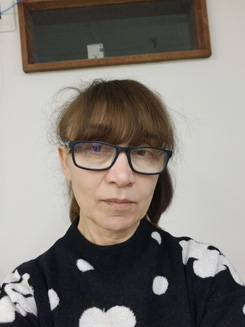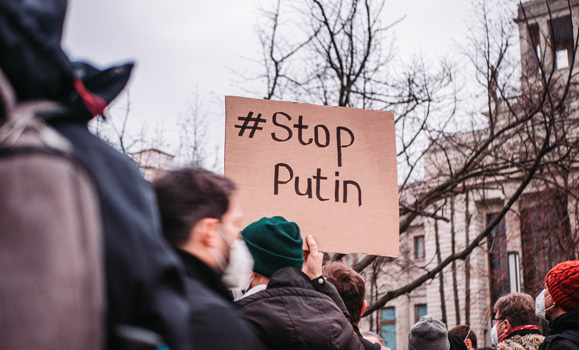It has been a long and tiring two weeks for Rita Kostyleva, a researcher in Dal‚Äôs Department of Psychology and Neuroscience ‚ÄĒ but not nearly as harrowing as it has been for her family members back home in Ukraine.
Before Russian President Vladimir Putin started his government’s invasion of Ukraine on Feb. 24, Rita and her colleague Jolanta Borycz were working together in Ian Meinertzhagen’s lab investigating the neural system of the fruit fly.
When the unbelievable happened and war broke out, some of the women and children of Rita’s family in Ukraine told her they were ready to leave and make their way for the Polish border.
Rita reached out to Jolanta, who has family in Poland, and together they arranged for Rita’s family to get out of Odesa, Ukraine and over the border into Kielce, Poland. They say this part of Rita’s family, two women and two children, left with only overnight bags and what they could carry.
 Rita’s family traveled by train to Lviv, Ukraine and then from there transferred onto a bus that took them into Lodz, Poland. The weather was cold, and the stations were packed. Upon arrival, they were met by Jolanta’s sister at around 3 a.m. She drove them to their new accommodations in Kielce, where they settled into warm beds with food and other necessities.
Rita’s family traveled by train to Lviv, Ukraine and then from there transferred onto a bus that took them into Lodz, Poland. The weather was cold, and the stations were packed. Upon arrival, they were met by Jolanta’s sister at around 3 a.m. She drove them to their new accommodations in Kielce, where they settled into warm beds with food and other necessities.
‚ÄúThe Polish are trying to help as much as possible,‚ÄĚ says Rita, shown right. ‚ÄúIt's a very big challenge because it's more than a million in Ukrainian refugees, mostly kids, in Poland right now.‚ÄĚ
Rita says that the travel from Odesa to Kielce was ‚Äúokay‚ÄĚ by train and bus, but it took three days when the trip usually takes 16 hours.
She remains worried for the children, her older family members who have decided to stay and, of course, the men in her family who have gone to fight for Ukraine. Rita began to cry as she recalled the images coming out of Russian attacked Ukraine.
‚ÄúIt‚Äôs not just war,‚ÄĚ she says, ‚Äúfor me, it's just more terroristic attacks after another.‚ÄĚ
So far, their homes in the face of Russian aggression.
Related reading: At Dal gathering, a silent show of resolve for peace in Ukraine
Giving everything they can
Rita explained she has other family members who had a much tougher time leaving.
‚ÄúThere is actually many volunteers on the border, so everybody tries to help anyway they can,‚ÄĚ she says. ‚ÄúBut the second group of my family, they walked for five hours through snow across the border. It was horrible. They had a very long day and night without sleeping.‚ÄĚ
When this group of eight got to Poland, they found a Polish farm. The property’s owners gave the group, three adults and five children including a toddler, an entire house to stay in on the farm’s property. According to Rita, this is at no cost and for as long as they need.
‚ÄúIt is challenging for a not very big country like Poland is, but everybody is trying to give everything they can,‚ÄĚ Rita says.
 People protest Russia's attack on Ukraine in Berlin, Germany. 
People protest Russia's attack on Ukraine in Berlin, Germany. 
Rita has older family members, including her mother-in-law, who live in what is now Russian occupied territory in Ukraine. Their credit and debit cards no longer work electronically as Visa and Mastercard have shut down in areas occupied by Russia. Rita says they are fine for now but questions how they will buy food if the war continues.
‚ÄúI don't know how long it's going to last, but we all hope that it's going to end soon,‚ÄĚ Rita says. ‚ÄúWith the help of rest of the world, Ukraine will win this.‚ÄĚ
For anyone wishing to help, Rita says donations can be made to or, she says, contact the federal government and urge them to aid Ukraine further.

